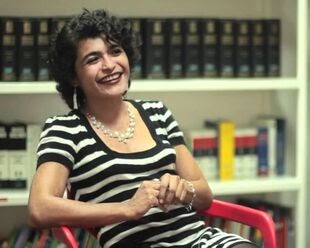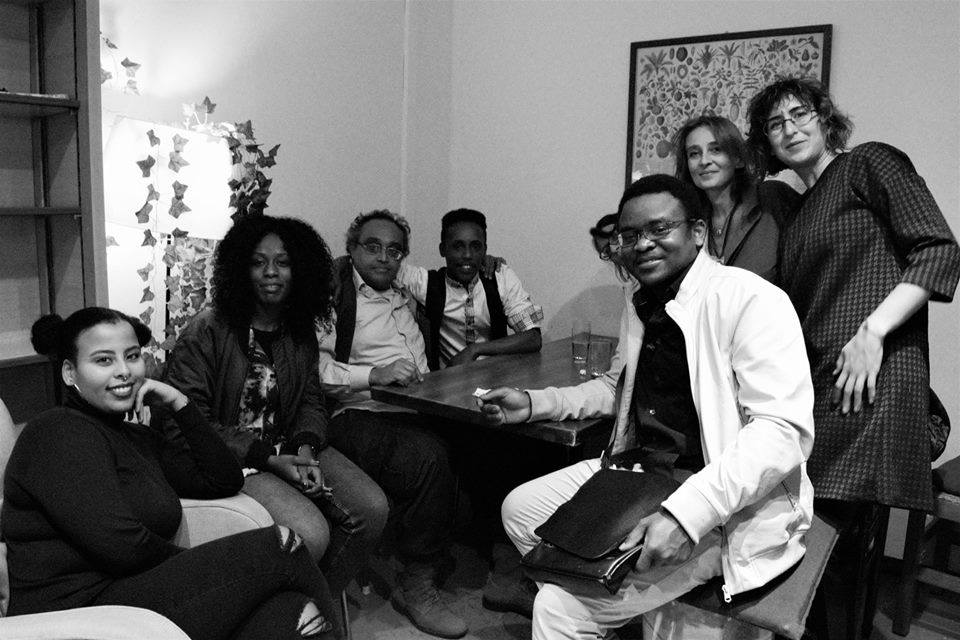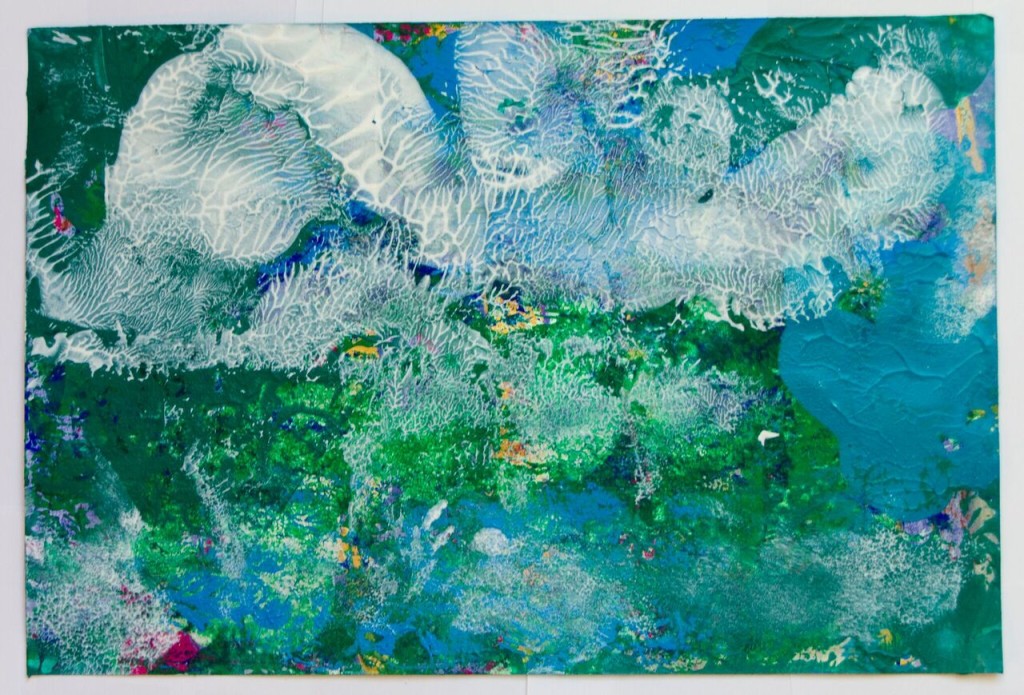This article containing poems by Krisma Mancí, from her collection Nueva cosecha (New Collection), Casa de poesía, Costa Rica, 2016, was first published in a bilingual version, Italian and Spanish, translated and edited by Lucia Cupertino. It appeared in the first issue of the journal I quaderni di Peripli, February 2024.; we thank Gianluca Asmundo for permission to translate and republish. The English translation is by Pina Piccolo. Cover art: anonymous graffiti artist working in American Canyon Ruins.
NOW THAT I FELT LIKE LIVING
Spanish language poetry from the Americas is quite well known, highly regarded, translated and published in Europe, on this side of the ocean. On closer inspection, it is often Rioplatense, Chilean, Mexican, and in some cases even Colombian poetry, but if we exclude the classics, there is very little available from Central America translated into other languages. With its myriad states expressing a special dynamism on the literary and poetic level, there is unfortunately little circulation of it within the Hispano American world and let alone outside of it. Therefore, it is doubly interesting to approach the poetic voice of Krisma Mancía, a Salvadoran poet whose poems are endowed with narrative texture without implying a loss of lyricism. Her poetry is capable of sinking into the most sordid territories of her country’s contemporary history, entering difficult neighborhoods and soaking up the life stories of the most destitute sectors of its population, the stolen childhoods of many girls, without displaying pious sentiments but rather, unmasking with sharp yet tender acumen the structural violence that is breathed there. A mature yet fresh poetic voice, honest and at the same time deep as a chasm. The three poems featured here are testimony to this. So much darkness hangs over the childhood of a bestial world, yet Krisma Mancía’s poetry wants to turn itself into a light in an attempt to change course.
***
I was living far away from myself.
I was thirteen and he was twenty-one
when I offered him a body full of needles and scars
in exchange for a sweet coin.
He asked: how are you?
and I answered: happy.
He kept on sticking needles into the butterflies tattooed
on my arms.
At the Casa de Mambrú, passed off as a pastry shop,
girls were haggled over on Sundays.
- Step back.
I just want to dance with you, he said.
Butterflies did not know sunlight,
that’s why they only drank carrot juice.
How are you?” he said.
Hanging from this beam, I pointed out.
The pastry shop was kept impeccably clean.
Children would come in and take candy without asking permission.
Paradise ended between the breasts of Madame Sissi,
the most expensive matron who pocketed the rent from the skins
while the little girls took off their clothes.
with the noise of a pink sky.
-Stop, baby doll.
Where were your lips
the bells were ringing? he asked.
The neighborhood was sordid.
Yo vivía lejos de mí.
Tenía trece años y él veintiuno
cuando le ofrecí un cuerpo lleno de agujas y cicatrices
a cambio de una moneda dulce.
Me preguntó: ¿cómo estás?
y respondí: feliz.
Siguió insertando agujas en las mariposas tatuadas
de mis brazos.
En la Casa de Mambrú, disfrazada de dulcería,
las niñas se contrataban en domingo.
-Returns.
Yo solo quiero bailar contigo, dijo.
Las mariposas no conocían la luz del sol,
por eso solo bebían jugo de zanahoria.
¿Cómo estás?, preguntó.
Colgada de esa viga, señalé.
Mantenían impecable la dulcería.
Los niños entraban y tomaban los caramelos sin pedir permiso.
El paraíso terminaba en los senos de tía Sissi,
la matrona más querida que cobraba la renta
de las pieles
mientras las niñas se quitaban los vestidos
Con el ruido de un cielo rosa.
-Pará, muñeca.
¿Dónde quedaron tus labios
cuando sonaron las campanas?, preguntó.
El barrio era sórdido.
***
I understand.
Little girls must not smile like the moon.
It is forbidden to show teeth, because wolves
love new teeth.
I understand.
The girls must not spread open their legs.
They attract bad luck, the unexpected, snakes in the house.
I understand.
(Stop yelling! said my mother when she saw the head pop out,
you whine like a little girl. You should have thought about it
before spreading open your legs.
Passionate child.
Spoiled child.
Perverted child.
You understand?)
No. I don’t understand.
Now I don’t understand
Because a line of ants came filing out of my legs.
I thought it was punishment
for trying to escape from my brother’s embrace.
I thought that suffocating under the weight of a body.
meant dying,
but I was wrong.
They took everything from me. I no longer have the right to be a child.
I grew up overnight.
Now another body comes out of my body.
I don’t understand.
Is the body an object? An object that multiplies?
Does it put out seeds for plowing?
Does it jingle coins under my dress?
Does the red color of that object belong to me?
(Your body is the Holy Supper, he said when he was born.)
Your body is so holy that it can be eaten.
I don’t understand.
I don’t understand.
I don’t understand.
Entiendo.
Las niñas no deben sonreír como la luna.
Está prohibido mostrar los dientes, porque los lobos
aman los dientes nuevos.
Entiendo.
Las niñas no abren las piernas.
Atraen la mala suerte, la deshora, las serpientes a casa.
Entiendo.
(¡Deja de gritar!, dijo mi madre cuando vio la cabeza asomarse,
chillas como una chiquilla. Lo hubieras pensado
antes de abrir las piernas.
Niña caliente.
Niña malcriada.
Niña perverse.
¿Entiendes ?)
No. No entiendo.
Ahora no entiendo
porque salió de mis piernas un hilo de hormigas
pensé que era el castigo
por tratar de escapar del abrazo de mi hermano.
Pensé que asfixiarme bajo el peso de un cuerpo
era morir,
pero me equivoqué.
Me han quitado todo. Ya no tengo derecho a ser niña.
Crecí en una noche.
Ahora sale otro cuerpo de mi cuerpo.
No entiendo.
¿El cuerpo es un objeto? ¿Un objeto que se multiplica?
¿Da semillas para el arado ?
¿Hace sonar sonar monedas bajo mi ropa?
¿El color rojo de ese objeto me pertenece?
(Tu cuerpo es la Santa Cena, dijo cuando nació.)
Mi cuerpo es tan santo que se come.
No entiendo.
No entiendo.
No entiendo.
***
Don’t give up on me.
I hate hugs. If someone touches me without warning, it hurts.
You know that a hug is a miracle
and we need to be prepared for it.
Holding tenderness by the waist. Pressing a body
against a chest.
Embedding your neck into another neck. It is a miracle.
A communion. It is an art to imagine that two heartbeats
come together.
Don’t give up on me. Tomorrow is April.
And today when I felt like living, it’s already late.
It is too late now.
Death seizes me in the belly,
The place that hurts me the most,
The place that most gave me life.
-Let’s get away from here.
-Where?
-Where there is no answer.
It is like waving at the statue of liberty
or kissing for the first time
or finding a medal on the seat of a bus.
or having a black and white photograph
or taking care of an invisible cat
or watering your ex’s plants.
We are good lovers when we travel.
Innocent
when we lie that we will keep that memory intact.
Tomorrow is April. Don’t give up on me.
Nothing will be left of me.
At most, shards.
and chipped cups that mean nothing but bad luck.
Now that I felt like living,
Life, which I have furiously beat up, refuses to follow me.
The swallow leaves the nest
And leaves that much-feared white sheet paper:
“I have turned sour.”
They promise to carve me a wonderful gallery of wounds.
It will be simple: they’ll cut here, sew there, suture,
they’ll insert…
It looks like a butcher shop, doctor.
Two abnormally sized ovaries, please!
Joke. I laugh about not melting.
Hug me. A hug is a miracle.
I never understood clues.
Let’s embrace the next lie together.
No me sueltes.
I hate los abrazos. Si alguien me toca sin aviso, duele.
Sabes que el abrazo es un milagro
y debemos estar preparados.
Acercar la ternura por la cintura. Presionar un cuerpo
contra un pecho.
Engarzar el cuello en otro cuello. Es un milagro.
Una comunión. Un arte imaginar que dos latidos
se unen.
No me sueltes. Mañana es abril.
Y hoy que quería vivir, ya es tarde.
Ya es demasiado tarde.
La muerte me pilla por el vientre,
por donde más me duele,
por donde más he vivido.
-Vámonos.
-¿Dónde?
-Donde no hay respuesta.
Es como saludar a la estatua de la libertad
o besar por primera vez
o encontrar una medalla en el asiento del bus
o tener una fotografía en blanco y negro
o cuidar un gato invisible
o regar las plantas de tu exnovia.
Somos buenos amantes cuando viajamos.
Inocentes
cuando mentimos que conservaremos el recuerdo intacto.
Mañana es abril. No me sueltes.
No quedará nada de mí.
A lo mucho astillas.
Y las tazas astilladas no son más que mala suerte.
Ahora que quería vivir,
la vida que golpeé con furia se niega a seguirme.
La golondrina abandona el nido
y deja el papelito blanco tan temido:
“Estoy ácida.
Prometen esculpirme una preciosa galería de heridas.
Será sencillo: cortarán aquí, coserán allá, sellarán,
meterán…
Suena a carnicería, doctor.
Dos ovarios tamaño anormal, ¡por favor!
Bromeo. Me río por no soltarme.
Abrázame. El abrazo es un milagro.
Nunca entendí las señales.
Abracemos juntos la siguiente mentira.
The Italian-Spanish version in I Quaderni di Peripli was republished from the first version that appeared in “The Body, Eros: anthology of poetic texts” (edited by Franca Alaimo and Antonio Melillo), Giuliano Ladolfi publisher, 2018.

Krisma Mancía, San Salvador, 1980. Poet and craftswoman specializing in handmade jewelry with alternative materials. She studied Literature at the Universidad de El Salvador (UES), Theater at La Escuela Arte del Actor and was part of the talent workshop of La Casa del Escritor de El Salvador under the tutelage of writer Rafael Menjívar Ochoa. She trained in sculpture and ceramics at the Centro Nacional de Artes (CENAR) and from a very young age received extensive training in gender issues and human rights.
She was the first director assigned to the Casa de la Cultura de la Mujer at the first Ciudad Mujer site. She currently works at the Ministry of Culture in El Salvador and coordinates the Juegos Florales Nacionales literary contest.
She has published La era del llanto (Dirección de Publicaciones e Impresos, El Salvador, 2004), Viaje al Imperio de las Ventanas Cerradas (La Garúa, by Santa Coloma de Gramenet, Barcelona, 2006) which won the I Premio de poesía joven La Garúa. Two of her new collections were issued in 2016 Nueva Cosecha (Casa de Poesía, Costa Rica) and Pájaros imaginarios y trenes invisibles entre tu ciudad y la mía, published in Spain by Valparaíso and also published by Editorial Municipal de la Alcaldía de San Salvador. Several of her literary writings have appeared in various cultural magazines, anthologies and periodicals in Latin America and Europe and have been translated into Italian, French and English.





















































